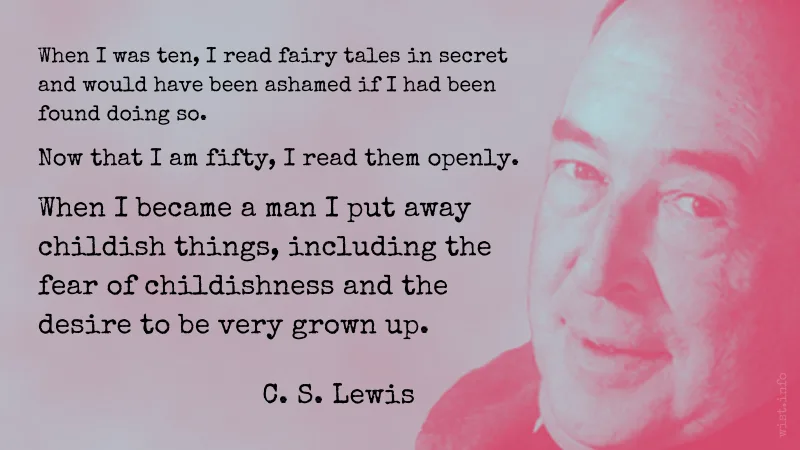Quotations about:
age
Note not all quotations have been tagged, so Search may find additional quotes on this topic.
Alonso of Aragon was wont to say in commendation of age, that age appears to be best in four things — old wood best to burn, old wine to drink, old friends to trust, and old authors to read.
Francis Bacon (1561-1626) English philosopher, scientist, author, statesman
Apothegms, # 97 (1624)See Alfonso X.
When I was ten, I read fairy tales in secret and would have been ashamed if I had been found doing so. Now that I am fifty, I read them openly. When I became a man I put away childish things, including the fear of childishness and the desire to be very grown up.
C. S. Lewis (1898-1963) English writer, literary scholar, lay theologian [Clive Staples Lewis]
“On Three Ways of Writing for Children,” lecture, Library Association Bournemouth Conference (29 Apr – 2 May 1952)
(Source)
Reprinted in On Stories (1966). Referencing 1 Corinthians 13:11.
The longest-lived and those who will die soonest lose the same thing. The present is all that they give up, since that is all you have, and what you do not have, you cannot lose.
[ἑτέρου δέ, ὅτι καὶ ὁ πολυχρονιώτατος καὶ ὁ τάχιστα τεθνηξόμενος τὸ ἴσον ἀποβάλλει. τὸ γὰρ παρόν ἐστι μόνον, οὗ στερίσκεσθαι μέλλει, εἴπερ γε ἔχει καὶ τοῦτο μόνον καὶ ὃ μὴ ἔχει τις οὐκ ἀποβάλλει.]Marcus Aurelius (AD 121-180) Roman emperor (161-180), Stoic philosopher
Meditations [To Himself; Τὰ εἰς ἑαυτόν], Book 2, ch. 14 (2.14) [tr. Hays (2003)]
(Source)
(Source (Greek)). Alternate translations:That life which any the longest liver, or the shortest liver parts with, is for length and duration the very same, for that only which is present, is that, which either of them can lose, as being that only which they have; for that which he hath not, no man can truly be said to lose.
[tr. Casaubon (1634), 2.12]When the longest, and shortest Lived Persons come to die, their Loss is equal: For as I observe the Present is their All, and they can Suffer no Farther.
[tr. Collier (1701)]Again that the longest and the shortest lives have an equal loss at Death. The present moment is all which either is deprived of, since that is all he has. A man cannot part with what he has not.
[tr. Hutcheson/Moor (1742)]He who lives the longest, and he who dies the earliest, when they do die, their loss is equal. For they are only deprived of the present moment, which is all they have to lose.
[tr. Graves (1792)]The longest liver and he who will die soonest lose just the same. For the present is the only thing of which a man can be deprived, if it is true that this is the only thing which he has, and that a man cannot lose a thing if he has it not.
[tr. Long (1862)]When the longest and shortest-lived persons come to die, their loss is equal; they can but lose the present as being the only thing they have; for that which he has not, no man can be truly said to lose.
[tr. Collier/Zimmern (1887)]The longest-lived and the shortest-lived man, when they come to die, lose one and the same thing.
[tr. Morgan (1894)]The loss of the longest-lived and the shortest is one and the same. It is the present only of which a man can be deprived, that and that only being his, and what is not his he cannot lose.
[tr. Rendall (1898)]He who lives longest and he who dies soonest have an equal loss in death. The present moment is all of which either is deprived, since that is all he has. No man can be robbed of that which he has not.
[tr. Hutcheson/Chrystal (1902)]The longest liver and he whose time to die comes soonest part with no more the one than the other. For it is but the present that a man can be deprived of, if, as is the fact, it is this alone that he has, and what he has not a man cannot part with.
[tr. Haines (Loeb) (1916)]The longest-lived and the soonest to die have an equal loss; for it is the present alone of which either will be deprived, since (as we saw) this is all he has and a man does not lose what he has not got.
[tr. Farquharson (1944)]When the longest- and shortest-lived of us come to die, their loss is precisely equal. For the sole thing of which any man can be deprived is the present; since this is all he owns, and nobody can lose what is not his.
[tr. Staniforth (1964)]The longest-lived and the earliest to die suffer an equal loss; for it is solely of the present moment that each will be deprived, if it is indeed the case that this is all that he has and a person cannot lose what he does not have.
[tr. Hard (1997 ed.)]Both the longest-lived and the earliest to die suffer the same loss. It is only the present moment of which either stands to be deprived: and if indeed this is all he has, he cannot lose what he does not have.
[tr. Hammond (2006)]The longest to live and the soonest to die lose exactly the same thing, for it is only the present moment which one can be deprived of, if it is true that we possess this alone, and that you cannot lose what you do not have.
[tr. Needleman/Piazza (2008), 2.16]The longest-lived and the earliest to die suffer an equal loss; for it is solely of the present moment that each will be deprived, if it is really the case that this is all he has and a person cannot lose what he does not have.
[tr. Hard (2011 ed.)]Both the one who lives longest and the one who is earliest to die lose an equal amount. The present moment is the only thing of which anyone can be deprived, at least if this is the only thing he has and he cannot lose what he has not got.
[tr. Gill (2013)]The longest and shortest life is therefore the same. We all live in the same present, which is but a moment of time. This moment can be lost in a moment, but that is all that can be lost. The past and future cannot be lost: no one can take from a man what he never had. Time is an infinite eternity and so everything will come around again eventually, it makes no difference how long this might take to happen. The present moment is the only thing any man has.
[tr. McNeill (2019)]
The invention of the teenager was a mistake, in Miss Manners’ opinion. […] Once you identify a period of life in which people have few restrictions and, at the same time, few responsibilities — they get to stay out late but don’t have to pay taxes — naturally nobody wants to live any other way.
Judith Martin (b. 1938) American author, journalist, etiquette expert [a.k.a. Miss Manners]
Miss Manners’ Guide for the the Turn-of-the-Millennium, Part 2 “Home Life,” “Parents and Children” (1989)
(Source)








